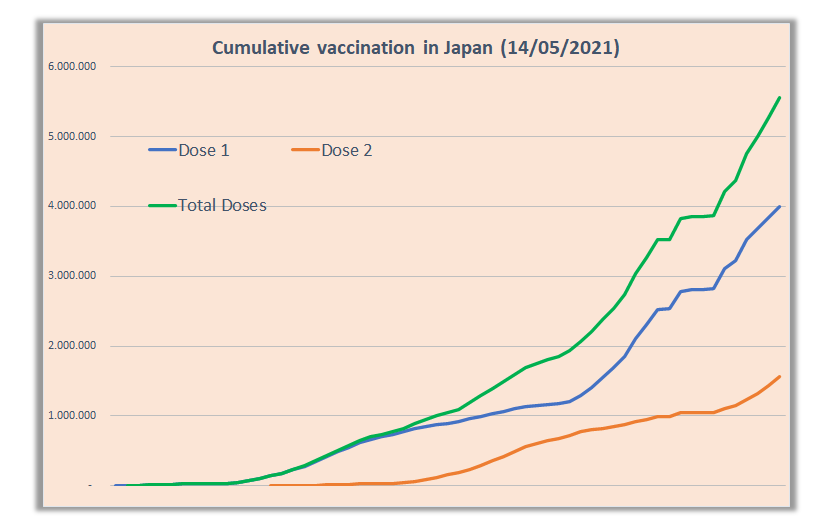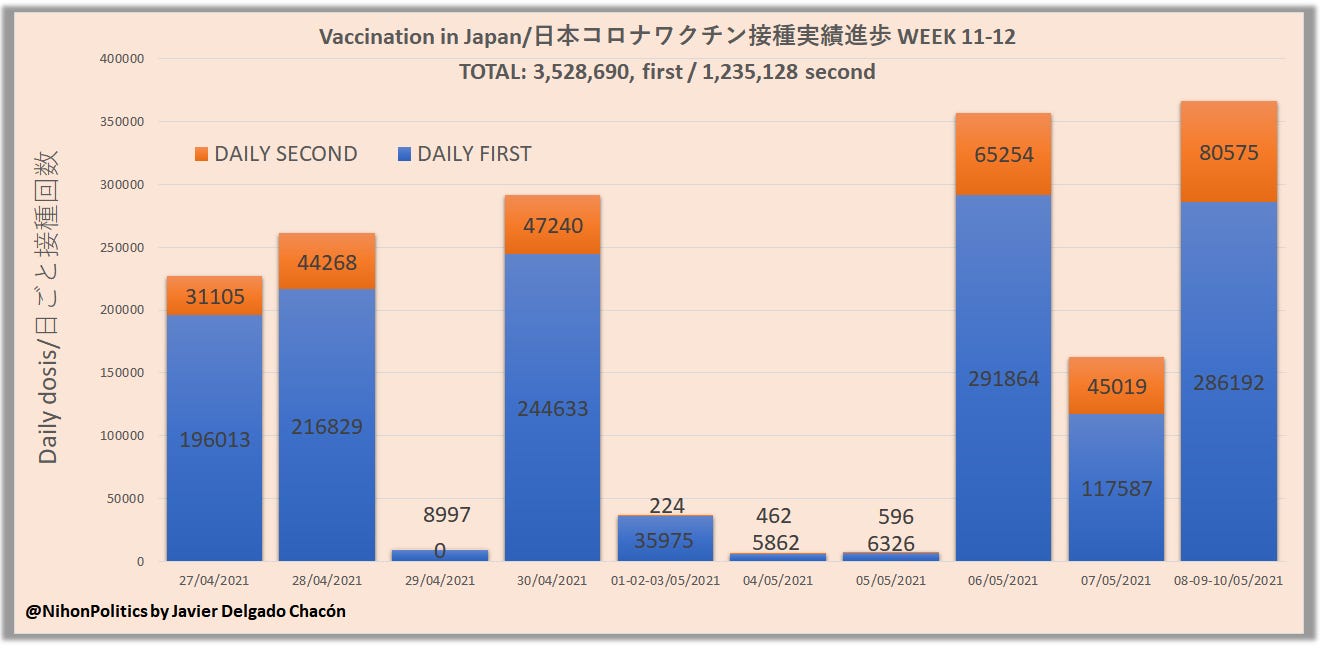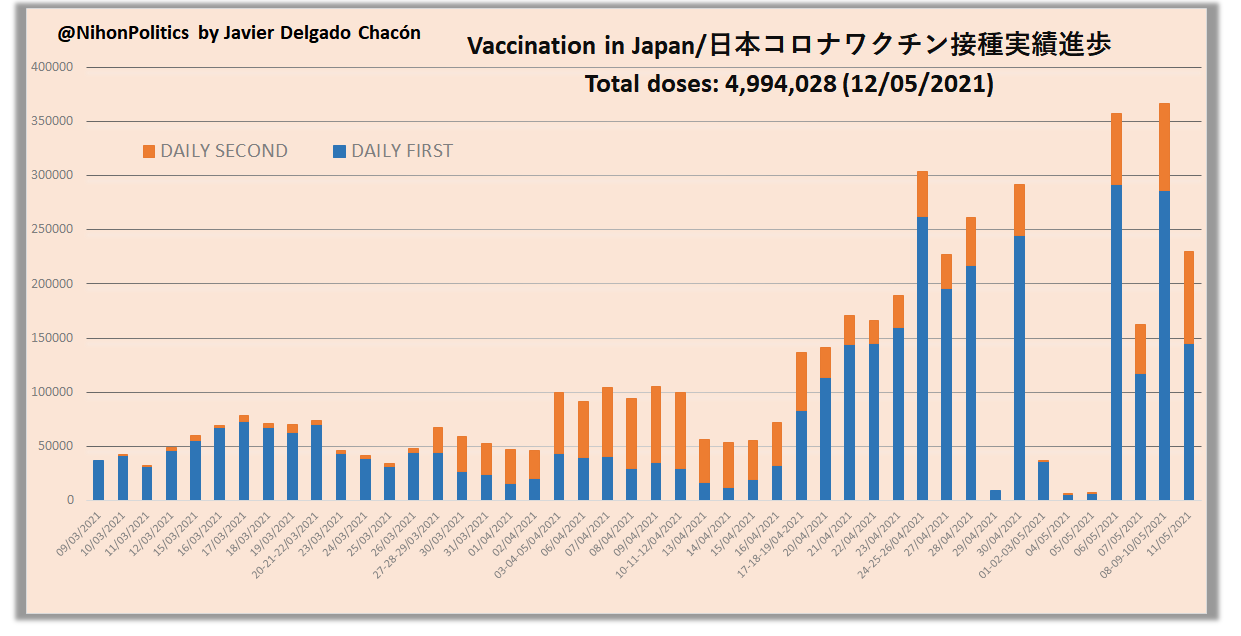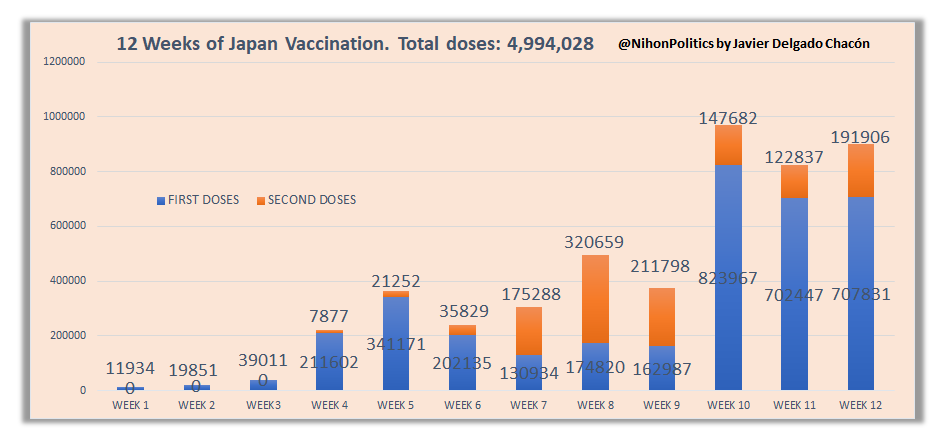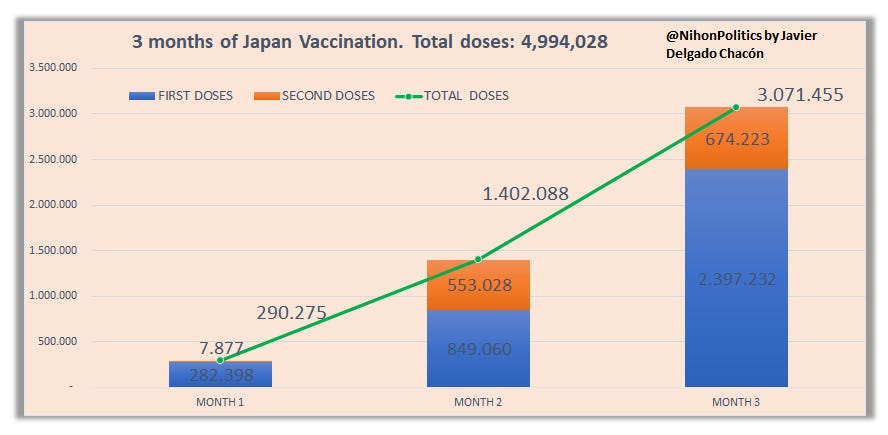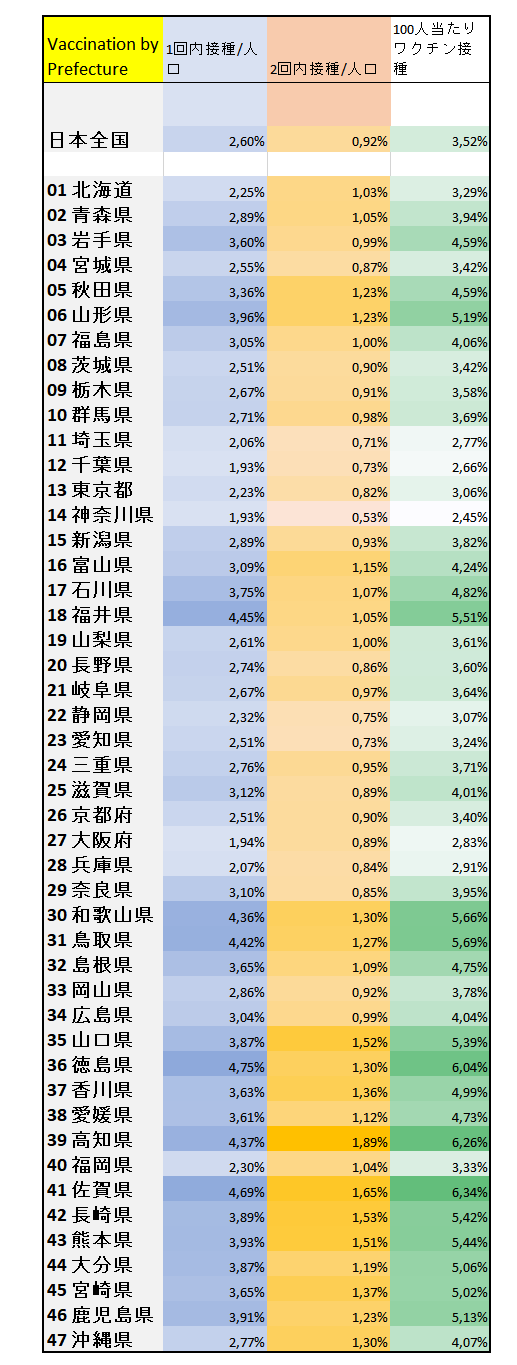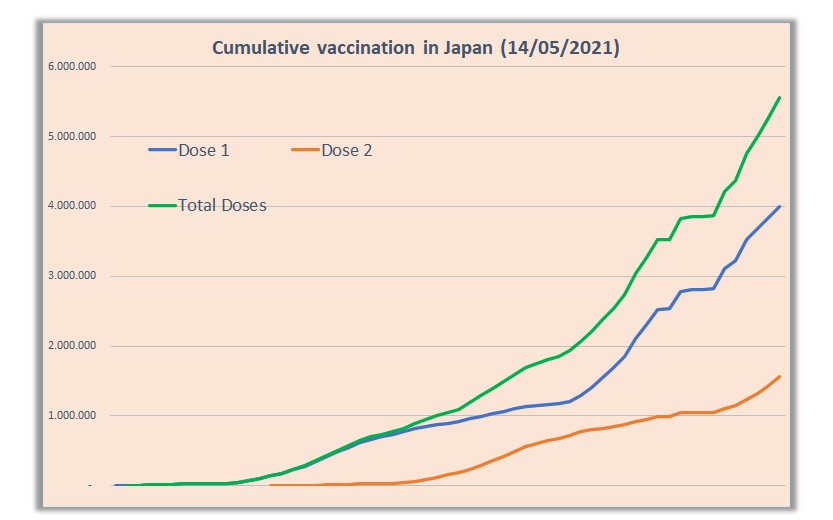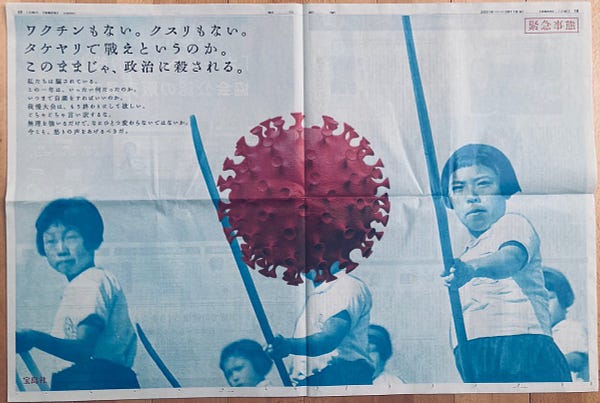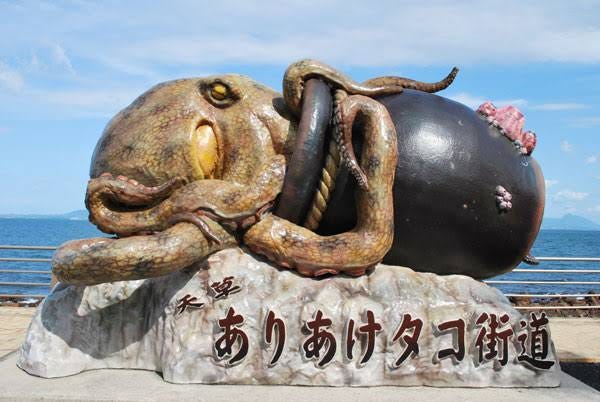Three Months of Vaccination in Japan
The National Referendum Law, Gay Marriage and a Murder Attempt
Hello everyone. Thank you for reading my Newsletter once again.
Now that you are here, you can subscribe, if you still haven’t done so, so you don’t miss anything!
This week, I’d like to focus on the first three months of the vaccination process in Japan, so expect some charts below.
But first, Today’s Newsletter:
The Essentials: News and weekly politics about Japan.🏆
Progress on the Vaccination Process of Japan💉
Tweet(s) of the Week💬
The Essentials 🏆
The Diet Reforms the National Referendum Law
After years of discussion and a heated debate, last week, the Lower House of the Diet approved a reform of the National Referendum Law「国民投票法」; this legislation is essential to any constitutional reform given that the Constitution mandates a nationwide referendum to approve any change to the constitution. It has never taken place before but the LDP has been seeking constitutional reform for decades.
In the end, the final reform of the referendum law was a compromise between the LDP and Japan’s main opposition party, the Constitutional Democratic Party of Japan, who were able to fuse their proposals, basically proposing the following changes:
To increase the number of polling places to new infrastructures like train stations or shopping centers1, as It had been proposed back in 2018 by the LDP, Komeito and Ishin no Kai.
Within three years, to regulate and establish limits to political advertising and tv spending in the run-up to an eventual referendum, in order to protect a fair competition between both sides, as it was proposed by the CDPJ.

The amendment to the law took into consideration these proposals and was approved in its entirety by the Constitutional Committee of the Lower House2. During the debate, other opposition parties on the left, like the JCP and the SDPJ, strenuously rejected the reform. They alleged that even a narrow reform of the National Referendum Law, like the one passed, opened the door to the mere discussion of constitutional reform, which they have been opposing for decades. It looks like the CDPJ, with the support of the DPFP, decided to do away with the discussion by saying yes to the reform, in order not to impede the electoral cooperation with the Communists before the general election in the Fall.
Each party played the role it had to play and made the tactical moves it made sense to make.
I do wonder, however, for how long can the JCP maintain its rejection of an eventual constitutional reform, even if it is not about article 9, the basic tenet of Japan’s pacifism, and a core policy of the party…
In the last hours, the full Lower House of the Diet approved the bill. Henceforth, the Upper House is expected to take up the bill in the coming days for full approval.

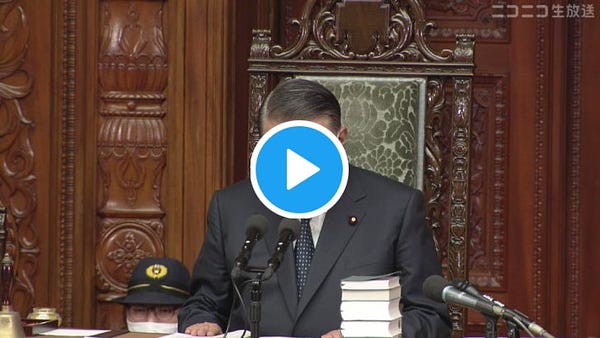
After the amendment was passed, the week finished with the Secretary-General of Ishin no Kai, Baba Nobuyuki「馬場伸幸」insulting the CDPJ, calling it an “unnecessary party in Japan” for supporting now the reform after his party had proposed it years ago. The people of Ishin no Kai, always so classy3…
Two New Regional Polls shows the Depth of Support for Gay Marriage in Japan (HT @writerofscratch)
In the last weeks, two different newspapers in Japan published polls about gay marriage in their prefectures, and they show overwhelming support for the full legal recognition of same-sex unions⚭.
It’s time for gay marriage in Japan!
Hokkaido ⛄
From the 16th to the 18th of April, the Hokkaido Shinbun「北海道新聞」conducted a survey on its population about issues like gay marriage and it found staggering numbers in favor. Over 70% of the respondents were in favor of gay marriage while only 21% of them were against legally recognizing it. The results, though, were skewed by age :
Below 30歳: 88% in favor of gay marriage
40-50代: 85% in favor of gay marriage
Over 70歳: only 44% were in favor of gay marriage
The drop-off in support by seniors in the prefecture is quite big (of +40 points). On the other hand, the survey barely found a gender gap between men and women: 67% of male respondents were in favor, in contrast to over 72% of females.
On the same poll, the newspaper also asked about the Separate Surname Policy, which I have touched upon in previous newsletters. The results were similar, age and gender-wise:
It’s just one poll, but I find it interesting that women appear to be less favorable (-9%) than men, to the separate surname policy, in contrast to the question of same-sex marriage.
Sadly, they did not provide data by political party.
Okinawa 🌴
In recent days too, the Okinawa Ryukyu Shinpo 「琉球新報」ran a survey among the 48 members of the prefectural assembly and 9 members from Okinawa on the National Diet in Tokyo, to gauge their opinions about social issues like gay marriage, and the results were reassuringly positive. The strength of the opposition4 in Okinawa is possibly responsible for the numbers collected in the survey: they are almost universally supportive of very different social policies like the legalization of gay marriage and the “separate surname policy”, in contrast to the LDP conservatives.
All three policies questioned in the survey were:
Gay marriage
Separate surname policy
Partnership system for gay unions
All of them were overwhelmingly supported by Okinawan politicians. The separate surname policy found the most resistance (27% against) but among those in favor, 54% were strongly for it.
The partnership system5, which can be seen as a middle road between the current situation and full recognition of gay marriage, garnered broad support even from members of the LDP.
I think it is a matter of time until Japan approves gay marriage and becomes the second Asian country, after Taiwan, with full recognition. Last week, on the Constitution Memorial Day, the Chief Justice of the Japanese Supreme Court, Otani Naoto「大谷直人」publcily said that the “Japanese judges have a broad vision on social issues like gay marriage and that they know how to respond to the current times”. Let’s hope so.
The Japanese society is ready. It only needs a responsive government that answers to the desires of the people and legalizes it once and for all.🌈
LDP MP Sugawara Isshu to be Prosecuted for Giving Gifts to Constituents
According to the Sankei Newspaper, a team of Tokyo Prosecutors is assembling a new criminal case against the LDP member of the Diet Sugawara Ishhu「菅原一秀」 (Toyko 9th District) for allegedly giving gifts to constituents in the last several years on different social occasions, like funerals.


This case, which had been languishing for months, is back on the news once the investigators decided to reopen it, following new leads and more gifts endowed by the politician, which are explicitly prohibited by law. To this day, Sugawara Ishhu is still the candidate of the LDP in Tokyo’s 9th District, even though one would think he’s damaged for this year’s election.
These are his results in the last three elections:
In 2017 he was reelected with 49% of the vote
In 2014 he was reelected with 51% of the vote
In 2012 he was elected with 53% of the vote
The 9th district of Tokyo, which represents a majority of Nerima Ward, has been competitive for years.
Nerima Ward「練馬区」 itself had the following results in the last national election to take place, in 2019 for the House of Councillors:
LDP (32.4%) + Komeito (11.1%) = 43.5%
JCP (11.1%) + CDPJ (18.5%) + DPFP (4.8%) + SDPJ (2%) + Reiwa (8%) = 44.4%
Ishin no Kai = 8%
Anti-NHK party = 2.4%
Happines RealizationParty = 0.3%
A pure tossup. Precisely, in the next election, Sugawara Usshu will face Yamagashi Issei「山岸一生」, a CDPJ politician who, by 30k votes, failed to take one of the six seats from Tokyo in the Upper House election of that same year, 2019 (in Nerima-Ku he won 9.1% of the vote). It’ll be a tough election battle.

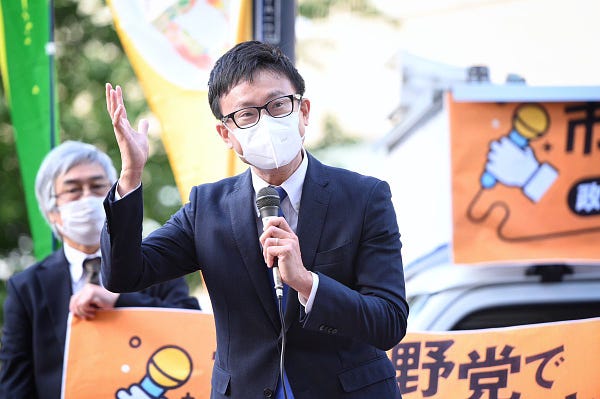
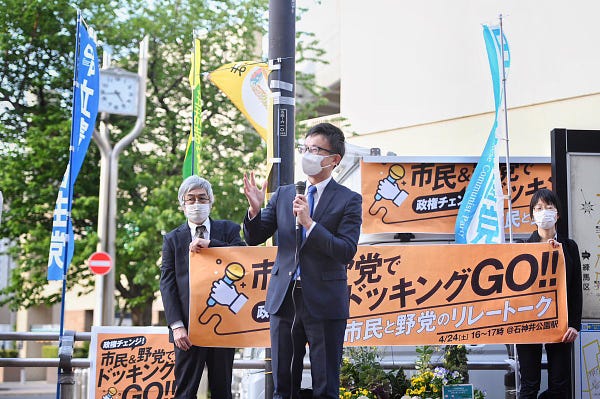
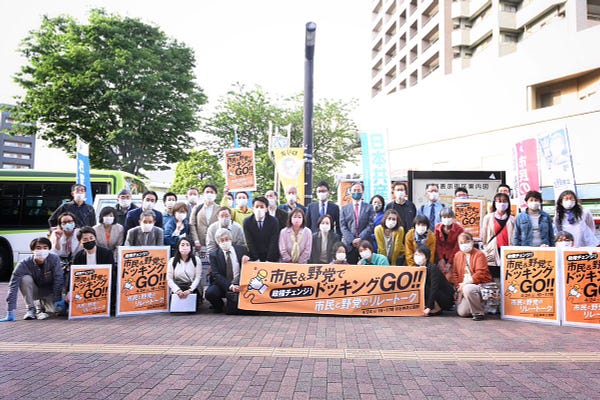
A Secretary of Umemura Mizuho Detained for Attempted Murder 🚗
On the 26th of April, a government-paid secretary of Ishin no Kai’s MP Umemura Mizuho「梅村みずほ」was detained in Osaka for the attempted murder of another man with his car. Apparently, the secretary of Umemura Mizuho, who is a 1-term member of the Upper Hosue, was having dinner with other men when a fistfight ensued, he went for his car and tried to run over one of them, at Sakai Ward in Sakai City (south of Osaka). The incident was first reported by the weekly Nikkan Gendai, which has been derisively reporting about these and other scandals of Ishin no Kai for years…
Umemura Mizuho has already apologized.


I remember Umemura for her first run to the Upper House in 2019, just when I was getting interested in Japanese politics. Her win that year was certainly impressive for a newcomer: she won the top seat with 21% of the vote and 730k total votes. She became, thus, only the fourth Ishin no Kai member to represent Osaka in the Upper House (her party currently controls 4 out of 8 seats Osaka Prefecture is allocated for the 参議院).
Progress on the Vaccination Process in Japan💉
After Golden Week, we arrived to a milestone in the Japan Vaccination process: it took 12 full weeks, three months since the first dose of the Pfizer vaccine arrived in Japan and the first healthcare workers received their shot, to reach 4 million doses administered.
Because of Golden Week, the data from the last two weeks have been difficult to deal with. It’s been noisy. The Kantei, which publishes the daily vaccination data, does it on separate files between the vaccination of healthcare workers and seniors. That explains why in the chart below you can see days with very few doses administered.
The data from those days is from the vaccination of Japanese seniors. On the same days, healthcare workers were also vaccinated, but the numbers are added the following day.
Since the process started, the daily rate of doses administered has been slowly increasing. We are stuck now at a little more than 200k doses per day. It is NOT enough.
If you take a close look at the chart, there were only three entries with over 300k doses a day, since it all started back in February. However, they were not weekdays:
Those three days were either Mondays (when the doses of the weekend are collected) or right after the end of Golden Week.
In 12 weeks of vaccination, almost 4 million doses have been administered in Japan. This is the weekly distribution (not quite yet on 1 million/week):
Week 1: 11. 934 // Week 2: 19.851 // Week 3: 39.011 // Week 4: 219.479
Week 5: 362.423 // Week 6: 23.7964 // Week 7: 306.222 // Week 8: 495.479
Week 9: 374.785 // Week 10: 971.649 // Week 11: 825.284 // Week 12: 899.737
The country has received millions of doses, which are stored in freezers somewhere. Thus, Japan has no problem neither of supply nor demand. Japan just needs to use the doses it has!
Yet, it’s good to see no significant dropoff in the number of first doses. In fact, the vaccination of the elderly is just getting started! There's a lot of capacity to ramp up the daily doses (first and second ones). We just need the authorities to do it.
The uneven change in the weekly administration of doses is best seen in the monthly data below, where you can appreciate the progress:
This is the monthly increase in total and by each dose:
Month 1➡️Month 2:
Total Increase: 383%🔼
Dose 1 increase: 201%
Dose 2 increase: 6921%
Month 2➡️Month 3:
Total Increase: 119%🔼
Dose 1 increase: 182%
Dose 2 increase: 22%
In the fourth month of the vaccination, we should expect a new big increase of first doses (for the elderly) along with second doses for health care workers. Easily, Japan should exceed the 3 million doses/per month they have had previously. Mass vaccination for seniors is slated to start in the last days of May.
The Japanese government also provides data by prefecture, even though it is only updated once a week. Thus, the data is somewhat outdated.
The numbers are still sadly low…😥
Not even 3% of the population has 1 dose or 1% is completely vaccinated in Japan.
Dose 1️⃣ Top three: Dose 2️⃣ Top three:
Tokushima 4.75% 1. Kochi 1.89%
Saga 4.69% 2. Saga 1.65%
Fukui 4.45% 3. Nagasaki 1.53%
It appears that Kyushu is at a more advanced stage of the vaccination (with figures close to 4% of the population with a first dose), while the most populated prefectures of the country, like Osaka, Saitama or Kanagawa are at the bottom of the list; I wonder if they are receiving fewer doses.
Overall, we need Japan to ramp up the vaccination. The pace is certainly increasing, but it’s not enough. 🚀 🚀
Tweet(s) of the Week💬
Is it a good use of covid relief money to erect a huge Ika?
🙄🙄


Thank you so much for reading this week’s entry.
You can see me every day on Twitter at @Nihonpolitics, where I also follow the vaccination process. I’ll be back next Thursday with another issue of the newsletter.
Help me spread the word about the Nihopolitics! You can subscribe below if you like Japan or politics in general. 📧👇📧
I appreciate it, a LOT. 😊
This article from Jiji neatly explains the concept of 「共通投票所」: they are polling places where citizens can vote freely regardless of their own designated locations in their neighborhoods. Some argue it could be effective in raising turnout.
For a great overview of the bill and, especially, the committee that deals with constitutional issues, check out The Japan Times’ Eric Johnston’s take on the issue.
I really would like to know why the people of Ishin no Kai HATE (that’s the word, hate) so much the other side of the aisle, especially the opposition parties like the CDPJ…
The Opposition parties, including the CDPJ, the JCP, the SDPJ and the local Okinawa Social Mass Party, narrowly control the Okinawa Prefectural Assembly. Furthermore, three out of four SMDs in the Lower House and the two Upper House seats from Okinawa are in hands of politicians from the Opposition.
Go follow the great @writerofscratch who is doing an excellent job in all issues concerning LGTBQ in Japan, including the gradual expansion of the partnership system throughout the country.




